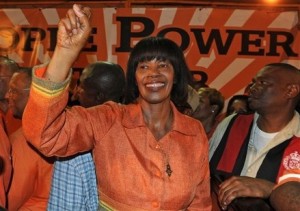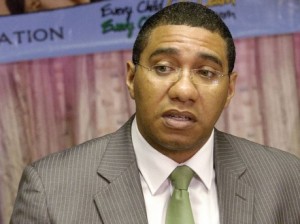 Today, a week to the day after leading her People’s National Party (PNP) to a landslide victory over the ruling Jamaica Labour Party (JLP), Portia Simpson Miller will be taking the oath of office as prime minister of Jamaica. She pledges to:
Today, a week to the day after leading her People’s National Party (PNP) to a landslide victory over the ruling Jamaica Labour Party (JLP), Portia Simpson Miller will be taking the oath of office as prime minister of Jamaica. She pledges to:
…accept the mandate of the people with humility [and to work] unswervingly to achieve the desired growth, development, and to lift the standard of living in Jamaica.
(The Gleaner, January 5, 2006)
Well, if nothing else, she seems to have learned from her previous 530-day stint as prime minster (March 2006 to September 2007) how important setting the right tone for governing is to achieving success in office.
Nothing demonstrates this quite like her reportedly cutting off all of the extravagant trappings that usually attend swearing-in ceremonies. She clearly wants to be seen as leading by example when it comes to implementing the austerity measures that are necessary to lift Jamaica out of its economic woes – most notably an $18 billion debt (which is a Greek-like 130 percent of its GDP).
Recall that Simpson Miller made history back in March 2006 when she became Jamaica’s first female prime minister. And I was as proud as any non-Jamaican could be.
Nonetheless, I felt compelled to rain on her parade a little by noting in Jamaica celebrates its first female prime minister that she did not win an election mandate – as she was merely serving out the remainder of the term of retiring Prime Minister PJ Paterson.
More to the point, though, Simpson Miller seemed more interested in posing as an historic figure than in governing as a public servant. This was brought into stark relief when she sat Nero-like while Jamaicans were being devastated by Hurricane Dean. But there was more:
Disaffection and disillusionment with the PNP and her leadership emanate far more from her failure to stem the tides of chronic unemployment, abject poverty, and violent crime… Indeed, nothing damned Simpson Miller’s prospects of winning a national mandate in her own right more than the 17 murders that occurred just last weekend. Not to mention the stench of corruption that trailed her campaign.
(Simpson Miller out after 18 months, The iPINIONS Journal, September 4, 2007)
This ignominious failure alone is why I am convinced that Simpson Miller not only appreciates the significance of her mandate this time around, but welcomes the opportunity to prove that she can govern too. Her party now controls 42 seats in parliament; the JPL only 21. So she really has no excuse.
 That said, it would be remiss of me not to comment on the irony, if not symmetry, of JPL leader Andrew Holness (39) making history by becoming the youngest prime minister in Jamaican history. For, like Simpson Miller, he only attained this distinction by being appointed to serve out the term of another prime minister – in his case, the resigning PM Bruce Golding.
That said, it would be remiss of me not to comment on the irony, if not symmetry, of JPL leader Andrew Holness (39) making history by becoming the youngest prime minister in Jamaican history. For, like Simpson Miller, he only attained this distinction by being appointed to serve out the term of another prime minister – in his case, the resigning PM Bruce Golding.
In fairness to Holness, however, he was fated to make history by becoming the nation’s shortest serving prime minister as well. For it is no stretch to assert that the political mess that forced Golding to resign was similar to the political mess that forced U.S. president Richard Nixon to resign.
Golding’s downfall stemmed from revelations about his Faustian alliance with notorious drug kingpin Dudas Coke; Nixon’s from revelations about his involvement in the notorious Watergate break-in.
But just as the Watergate affair left the Republican Party so discredited that Gerald Ford became a failed president serving when he replaced Nixon, the Coke affair left the JPL so discredited that Holness became a failed prime minister serving when he replaced Golding. (I wrote about the Coke affair in Political fraternization come home to roost in Jamaica.)
I just hope Simpson Miller and the left-leaning PNP make more of their opportunity to clean up the mess Golding and the right-leaning JPL left behind than Jimmy Carter and the left-leaning Democratic Party did of their opportunity to clean up that which Nixon and the right-leaning Republican Party left.
I wish “Sister P” and her “comrades” well.
NOTE: Deadly violence has too often been a feature of national elections in Jamaica: 800 people were killed in 1980. It is particularly noteworthy therefore that only three people were reported killed during these elections, which took place on December 29.
Related commentaries:
Jamaica celebrates…
Simpson Miller out…
Political fraternization…